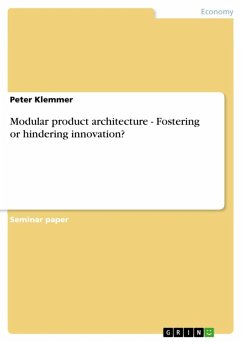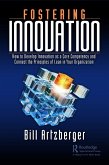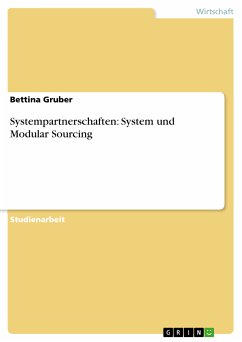Seminar paper from the year 2007 in the subject Business economics - Supply, Production, Logistics, grade: 2,0, LMU Munich (Innotec - Institut für Innovationsforschung, Technologiemanagement und Entrepreneurship), course: Innovationsmanagement: "Theorie – Empirie – Case Studies“ , language: English, abstract: Industrialization processes in the last decades have resulted in the emergence of immense new industries, which for a great part can be ascribed to comprehensive activities of technological innovation. Driven by dynamic market contexts such as globalization or technological advances leading to growing complexities and evolving consumer demands, firms are however increasingly affronted with the challenge to offer a greater variety of products of improved performance in less time and under lower costs (Momme et al. 2000, p.128; Ulrich/Eppinger 1995, p.5). Technological innovation as the means and ends of new product development therefore plays a significant role. Modular product architecture -with products that made up of a set of independent components, connected only via defined interfaces (Ulrich/Eppinger 1995, p.132)- is predominantly found in technologically intensive industries such as telecommunications, electronics or the automobile sector (Sanchez/Mahoney 1996, p.67; Staudenmayer et al 2005, p.308). Under the light of the challenges affronting firms, this paper examines the effects, modular product architecture has on technological innovation. This paper investigates the effects of modular product architecture with standardized open interfaces assuming many component producers and a central firm controlling the systemic fit of these. From a resource and production point of view, modularity in combination with a coherent process infrastructure enables firms to meet market demands described (Sanchez 2004, p.59). In addition, product-strategic flexibility is significantly improved involving the possibilities of mass-customization through flexible up- & downscaling. The setting described leads to an “outsourcing” of innovation activity to component producers, pursuing autonomous trial & error innovation and to consumers, independently performing mix & match innovation. Furthermore, this may induce changes on the architectural level of products (Baldwin/Clark 1997, p.85; Cusumano/Gawer 2002, p.55). The paper further suggests that technological innovation with modularity applied, leads to a steady evolution of products (Galvin/Morkel 2001, p.34; Langlois/Robertson 1992, p.310). The resulting changes can show sustaining (Christensen 1997, p. xv) character, but equally may disrupt existing knowledge in the event of integrative innovation. The X-Box case powerfully demonstrates key aspects of product modularity and its effects on technological innovation.
Bitte wählen Sie Ihr Anliegen aus.
Rechnungen
Retourenschein anfordern
Bestellstatus
Storno









